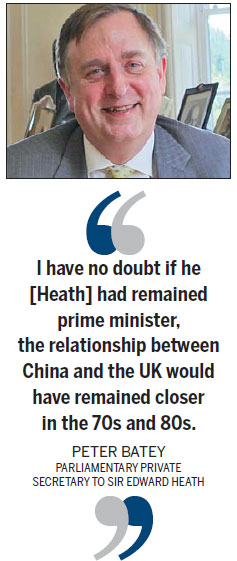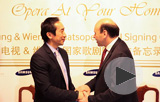Shift in economic focus brings China, UK closer
By Cecily Liu ( China Daily Europe ) Updated: 2014-07-25 06:14:36Former aide to Sir Edward Heath says Britain's role in helping China move to a more service oriented market will increase
A former political private secretary to the British prime minister who established full diplomatic relations between the UK and China in the 1970s, says the economies of both two nations are set to become more closely aligned.
Peter Batey, who worked alongside Sir Edward Heath from 1982 to 1986 - a decade after Heath was in Downing Street - says as China experiences its ongoing economic shift into a service oriented and domestic consumption-driven market, its potential to do business with the UK will increase.
Now chairman of Vermilion, an advisory firm he co-founded in 2004 which has strong links with China, Batey says China's strong economic ties with traditional manufacturing powers like Germany could decline as a result of that shift on focus, as its products move up the value chain and subsequently compete with those from there, and other markets.
Heath's four years in power, between 1970 and 1974, was a troubled time for the UK, with high levels of unemployment and ongoing conflicts with powerful trade unions.
But it was his foreign policy which drew most plaudits.
He took the United Kingdom into the European Community in October 1972, and he also favored stronger links with China.

He visited Mao Zedong in Beijing in 1974 and 1975 and remaining an honored guest in China on frequent visits, forming a close relationship with Mao, Zhou Enlai, the first premier of the People's Republic of China, and Deng Xiaoping.
Heath called an election in February 1974 in an effort to win a public mandate to face down a wage dispute with striking miners, but this instead resulted in a hung parliament, in which his Conservative party had the most votes, but the opposition Labour party had slightly more seats.
Following a failed attempt to establish a coalition government, Heath was forced to resign in favour of Harold Wilson, whose minority government won a small majority in a second election in October that year.
Heath was then ousted the following year as party leader too, by his former education secretary, Margaret Thatcher.
He returned to the Westminster backbenches to become a fierce critic of her policies as leader and, from 1979, as prime minister. He remained an MP until retiring in 2001.
Born in 1958, Batey took up a position with US banking giant Citibank, after a degree in philosophy, politics and economics at Oxford University, in 1981.
From 1982 to 1986 he served as political private secretary to Heath, after which he moved to Beijing as the accounting firm Arthur Andersen's chief representative in China.
In 1989 he and business partner Richard Burn co-founded Batey Burn, a China-focused government relations and investment advisory business.
In 1999 Batey became chairman of APCO Asia Ltd after APCO acquired Batey Burn. Batey left APCO Asia Ltd in 2004 and co-founded Vermilion Partners.
He first accompanied Heath to China in 1982 - the first of many trips there together - when they visited Beijing, Chongqing, Yichang and Wuhan.
"Heath visited China every year to 18 months, and each visit always consisted of a series of political meetings in Beijing combined with opportunities to see the Chinese culture," he says.
"The Chinese government was keen for Mr Heath to see different parts of the country."
He says Heath enjoyed visiting China for both political and personal reasons, because he loved China and he developed close personal relationships with a number of Chinese leaders including Mao, Zhou and Deng.
"He was keen to talk to them, and they were keen to talk to him.
"I have no doubt if he had remained Prime Minister, the relationship between China and the UK would have remained closer in the 70s and 80s," says Batey.
Fast-forward to the present day, Batey says as China's economy becomes more domestic consumption-led, he has already felt a great increase in diversity and involvement of British business in China.
When his firm was first set up, it mainly helped foreign companies enter the Chinese market to set up joint ventures because complex local regulatory restrictions at the time meant foreign companies had little choice but joint ventures.
But subsequently, foreign companies were allowed to enter the Chinese market as wholly foreign owned enterprises, or by acquiring Chinese companies, leading to a surge in the speed and diversity of foreign companies' expansion into China.
Batey says over the years the goal of many foreign companies expanding in China has also changed.
"The joint ventures of the early days were only in manufacturing exports, but by the mid-90s they were not just for exports - many were focused on addressing the domestic Chinese market," adds Batey.
His team has also widened its client base to include many Chinese companies expanding and investing abroad, and Batey believes the relationship between the UK and China, under the present government, is improving, but still more can be done.
He says he greatly enjoyed working for Heath, despite the high standard of work the former PM demanded of him.
"He could be difficult, but most of the time he was great fun to work for.
"He was very entertaining, and had a good sense of humor, but he did demand high standards, so you had to do your job properly," Batey recalls.
He says the role of a private secretary is a very personal one, and for that reason it is generally only healthy to do it for a couple of years and then move on, otherwise it creates too much interaction.
"You start to annoy one another," he smiles.
But he says when he became Heath's private secretary, he effectively remained in the role forever, because Heath felt he could still call on him for help at anytime.
"He would say, 'I want you to be in such a place on such a day', and we were fine with that," Batey adds.
The close relationship between the two also meant that the elder statesman - who finally served in the ceremonial role of Father of the House for his last nine years in parliament - was happy to introduce many of his contacts to Batey, whom he believed would help with his consulting business.
"When I set up the business, he could not have been more helpful," he says of his former boss.
"Anything he could do to help, he would do. I feel a great gratitude and loyalty towards him."
|
|
|
|
|
|
|
|
European Weekly
 We will not give up search, Li vows
We will not give up search, Li vows
International hunt for missing airliner continues after fruitless six-day search






















